新目标9上英语Unit9第3课时
Unit 9 第3课时Grammar--九年级英语人教版培优讲义含答案
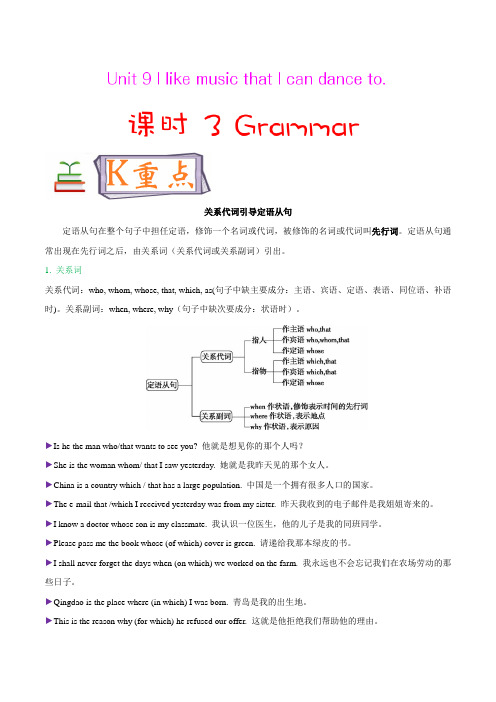
关系代词引导定语从句定语从句在整个句子中担任定语,修饰一个名词或代词,被修饰的名词或代词叫先行词。
定语从句通常出现在先行词之后,由关系词(关系代词或关系副词)引出。
1. 关系词关系代词:who, whom, whose, that, which, as(句子中缺主要成分:主语、宾语、定语、表语、同位语、补语时)。
关系副词:when, where, why(句子中缺次要成分:状语时)。
►Is he the man who/that wants to see you? 他就是想见你的那个人吗?►She is the woman whom/ that I saw yesterday. 她就是我昨天见的那个女人。
►China is a country which / that has a large population. 中国是一个拥有很多人口的国家。
►The e-mail that /which I received yesterday was from my sister. 昨天我收到的电子邮件是我姐姐寄来的。
►I know a doctor whose son is my classmate. 我认识一位医生,他的儿子是我的同班同学。
►Please pass me the book whose (of which) cover is green. 请递给我那本绿皮的书。
►I shall never forget the days when (on which) we worked on the farm. 我永远也不会忘记我们在农场劳动的那些日子。
►Qingdao is the place where (in which) I was born. 青岛是我的出生地。
►This is the reason why (for which) he refused our offer. 这就是他拒绝我们帮助他的理由。
九年级上册新目标 课件Unit 9导学案Section A3 (Grammar focus-4c)Section A3
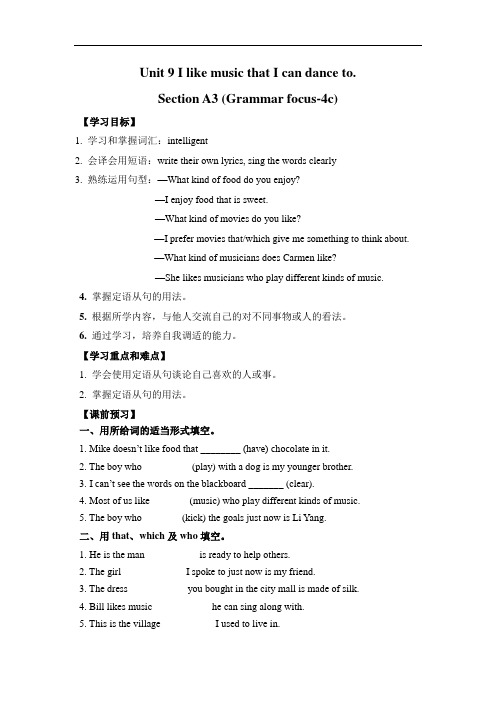
Unit 9 I like music that I can dance to.Section A3 (Grammar focus-4c)【学习目标】1. 学习和掌握词汇:intelligent2. 会译会用短语:write their own lyrics, sing the words clearly3. 熟练运用句型:—What kind of food do you enjoy?—I enjoy food that is sweet.—What kind of movies do you like?—I prefer movies that/which give me something to think about.—What kind of musicians does Carmen like?—She likes musicians who play different kinds of music.4.掌握定语从句的用法。
5.根据所学内容,与他人交流自己的对不同事物或人的看法。
6.通过学习,培养自我调适的能力。
【学习重点和难点】1. 学会使用定语从句谈论自己喜欢的人或事。
2. 掌握定语从句的用法。
【课前预习】一、用所给词的适当形式填空。
1. Mike doesn’t like food that ________ (have) chocolate in it.2. The boy who _________ (play) with a dog is my younger brother.3. I can’t see the words on the blackboard _______ (clear).4. Most of us like _______ (music) who play different kinds of music.5. The boy who _______ (kick) the goals just now is Li Yang.二、用that、which及who填空。
小学英语九年级上册人教版教案 Unit 9 第3课时

第3课时Section B(1a~1d)【教学目标】1.通过听力训练获取有效信息,从中了解他人喜欢的人或事,以及喜欢的原因。
2.学会交换不同的看法,并能以正确的心态面对自己和他人的好恶。
【教学重难点】重点:掌握句型“He likes clothes that are unusual.”。
难点:通过交流表达和听力训练,引入表达自己观点或好恶的方式。
【课堂导学案】Step 1复习(3分钟)让两个学生回答他们喜欢什么样的电影,并说明原因。
Step 2情景导入(3分钟)回顾:在前面的课程中我们已经学习并了解了一些音乐的信息和同学们喜爱的音乐种类。
下面通过回答几个问题来进行一下简单的回顾。
请几位学生尝试回答以下问题。
Questions:(1)Do you have your favorite band?What is it?(2)How many members are there in the band?(3)Which song of theirs do you like best?当然,也可讨论他们最喜爱的书籍和影片。
环节说明:课前的师生问答互动不仅让学生回顾了上节课的内容,而且还可以很自然地导入到本节课的内容,也为下一步的学习作了准备。
Step 3完成教材1a~1d教学任务1.要求学生翻开课本P69,迅速阅读1a部分的内容,并如实填写表格。
然后要求5~8名学生给出自己的答案,教师可选择一些列在黑板上。
(3分钟)2.完成1b左栏的任务。
让学生看图,然后听录音,写下他们谈论的物品,然后要求学生给出自己的答案。
(2分钟)3.听第二遍录音,完成课本上1b右栏的任务。
学生阅读表格中的信息,听录音,抓住关键的信息,并按要求写在表格中。
(2分钟)4.听力内容巩固训练。
要求学生根据所听到的内容完成下列对话。
完成后要求学生给出自己的答案,以巩固对听力内容的理解。
(3分钟)—What a good jacket!—Yeah,it's new.I really like it.I like clothes (1)that__are__unusual.—It's a book about volleyball.It tells about (2)how__to__become__a__good__player.—It's great.I like writers who (3)explain__things__well.—I love movies (4)that__are__scary,don't you?—I(5) sure__do.5.听第三遍录音,并打开听力材料,全班逐句进行跟读。
外研版九年级英语上册 Module 9 Unit 3优质教案
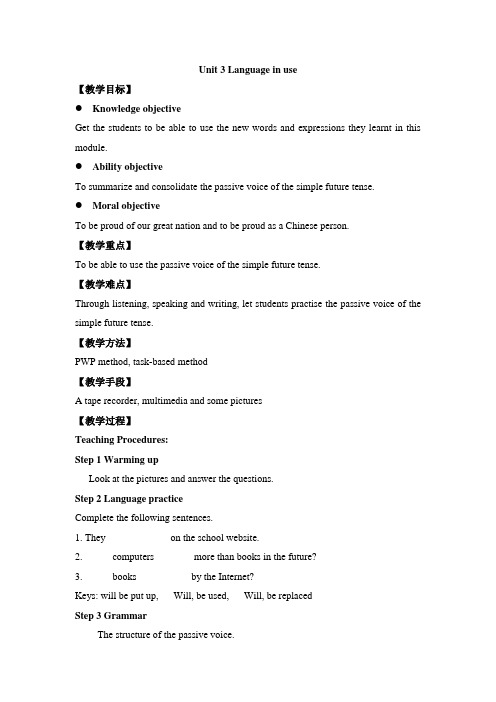
Unit 3 Language in use【教学目标】●Knowledge objectiveGet the students to be able to use the new words and expressions they learnt in this module.●Ability objectiveTo summarize and consolidate the passive voice of the simple future tense.●Moral objectiveTo be proud of our great nation and to be proud as a Chinese person.【教学重点】To be able to use the passive voice of the simple future tense.【教学难点】Through listening, speaking and writing, let students practise the passive voice of the simple future tense.【教学方法】PWP method, task-based method【教学手段】A tape recorder, multimedia and some pictures【教学过程】Teaching Procedures:Step 1 Warming upLook at the pictures and answer the questions.Step 2 Language practiceComplete the following sentences.1. They ____________ on the school website.2. _____ computers _______ more than books in the future?3. _____ books __________ by the Internet?Keys: will be put up, Will, be used, Will, be replacedStep 3 GrammarThe structure of the passive voice.Step 4 Complete the sentences and conversations with the correct form of the words and expressions in brackets1. ____ books ________ (replace) by computers in the future?2. My bike is broken. It _________ (fix) tomorrow.3. —Dad, can I use the Internet this evening?—Yes, but the computer is not on yet. The electricity ___________ (not connect) until nine o’clock.4. _____ the problem _____________ (talk about) at the meeting tomorrow?5. Who ____________ (invite) to give a report about great inventions next Friday?6. —When _____ the work __________ (finish)?—In two days.Keys: 1. Will, be replaced 2. will be fixed 3. won’t be connected4. will be talked about5. will be invited6. will, be finishedStep 5 Look and sayLook at the pictures and describe the new classroom that will be built. Use the words in the box to help you.A new classroom will be built.Keys: A new floor will be built.New furniture (desk/ chairs) will be bought.A new blackboard will be bought.A new interactive whiteboard will be bought.The windows and the door will be changed.The teacher’s desk will be painted.The lights will be changed.The color of the walls will be changed.The walls will be fixed.Step 6 TalkingWork in pairs. Talk about these great inventions.●1875●America●Alexander Graham BellA: When was the telephone invented?B: It was invented in 1875.…A: What kind of telephone do you think will be made in the future? B: …●1903●America●Wright Brothers●1924●Britain●John Logie BairdStep 7 Complete the sentences with the words in the box1Before the ___________ of printing, few people could read.2There were more books to sell, so the _____ in books grew.3Because more people could read, ideas ______ quickly.4What ________ will printing take in the future?Keys: introduction, trade, spread, directionStep 8 Listening1. Listen and find out where the speaker is.a). In a school library.b). In the British Library.c). In the British Museum.Keys: b2 .Listen again and answer the questions.1. Why were so few books produced in ancient times?2. Why were many old books copied onto a computer?3. How has the computer helped people read old books in the British Library?Keys: 1. Because they were written by hand.2. They are too valuable to be picked up and held in the hand.3. Old books were copied onto a computer a few years ago for people tobe able to read them without touching them.Step 9 Reading1.Read the passage and choose the best title.a) The history of the Internetb) The World Wide Webc) The Internet and the Webd) The future of the InternetKeys: c2.Read the passage and answer the questions.1. When was the Internet invented by the US government?2. What could people only send at first?3. Who invented the World Wide Web in 1991?4. Can people use e-commerce and online shopping to buy and sell things?Keys: 1. In the 1960s.2. They could only send very simple texts.3. A British scientist named Tim Berners-Lee.4. Yes, they can.3.Now complete the time table.In the 1960s: The Internet was invented for the army to use.In the 1970s: Scientists and businesspeople wanted to use the Internet to sendand receive messages.In 1991: The World Wide Web was invented.In the 1990s: More and more people started to use the Internet to send varioustypes of files.Today: The Web has hundreds of millions of users. It has changed the waypeople live, work and play.Step 10 Around the worldTo learn about e-books.Step 11 Discussion1.Work in groups. Prepare for your discussion.•Think of an invention that has changed your life.•Make notes about the invention:1 What is it?2 Why is it useful?•Research how the invention has been developed and make notes about what you find out.2.Discuss with your group.Tell your group about the invention. Ask them for their ideas.Make notes about your discussions.3.Present your findings to the class.Step 12中考链接1.The sports meeting _____ next month.A. will holdB. is going to holdC. will be held2. From May 6, pedestrians (行人) _____ 10 yuan if they run red lights, accordingto Beijing traffic authorities.A. will fineB. were finedC. are fineD. will be fined3. -A new park _____ in our hometown next year.-Really? Our hometown must be more beautiful.A. will buildB. will be builtC. is built4. It is said that an Asian Culture Village ______ inside the AYG, Village inNanjing in the coming Asian Youth Games period.A. buildsB. is buildingC. will be builtD. was built5. —How many people will _____ to yourbirthday party?—Twelve.A. inviteB. be invitedC. be invitingKeys: C, D, B, C, BStep 13 Homework你的朋友Jim迷恋上网,经常逃学,成绩下降。
新外研版九年级上册英语 Module 9 Unit 3 教案(教学设计)
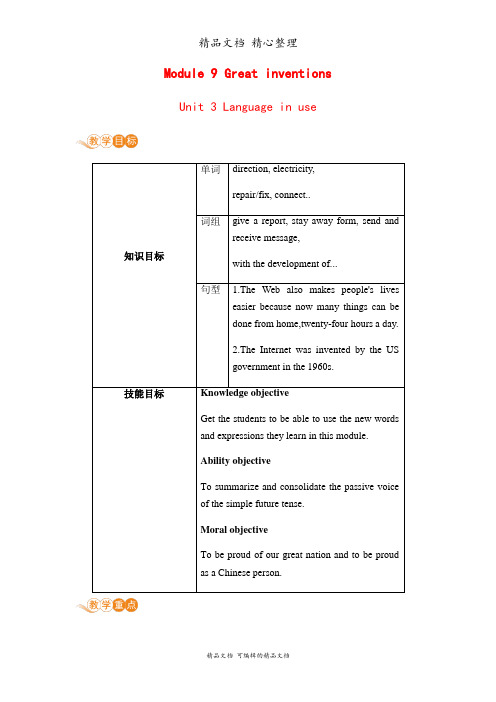
Module 9 Great inventions Unit 3 Language in use单词direction, electricity,To be able to use the passive voice of the simple future tense.Through listening, speaking and writing, let students practise the passive voice of the simple future tense.Step 1 Language practiceComplete the following sentences.1. They ____________ on the school website.2. _____ computers _______ more than books in the future?3. _____ books __________ by the Internet?Keys: will be put up, Will, be used, Will, be replacedStep 2 GrammarThe structure of the passive voice.一般现在时一般过去时 一般将来时肯定 主语+am/is/are +done 主语+ was/were +done 主语+will/ be (am/is/are) going to +be +doneStep 3完成教材Activities 1~7的任务1plete the sentences and conversations with the correct form of the words and expression in brackets.(Activity 1)(1)学生个体活动,完成填空。
(2)教师点名,个体汇报,全班核对答案。
最新人教新目标版九上英语Unit9SectionA(3a-3c)【教案】
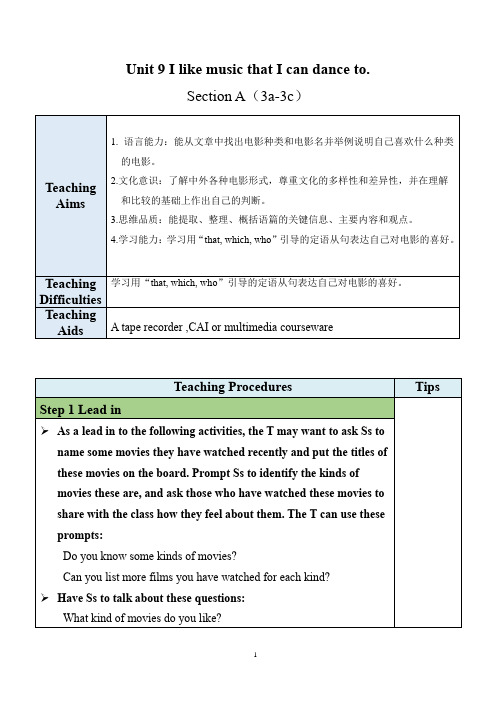
Action movies: exciting, do not require thinking;
Movies that are scary: can be fun but too scared to watch alone.
edies, cartoons and action movies.
After Ss finish the chart, the T can encourage Ss to paraphrase the points of the writer.
3c
The T can point out to Ss that the aim of this activity is to provide Ss with further practice in using the target language to express preferences. The T can have Ss fill in the chart individually, then share their answers in groups.
comedy- a funny movie
cartoon- a film made from a series of drawings
drama- a movie with a serious subject
documentary-a film that gives factual information about a subject
Step4Summary & Homework
The homework can vary with the specific conditions.
Summary The T can encourage Ss to summarize the key points of this class to help Ss consolidate the knowledge.
新目标九年级英语UNIT9分课时教案

Unit 9I like music that I can dance to.类别课程标准要求掌握的项目话题In this unit, students learn to talk about music and movies.重点单词Section A1.prefer v.更喜欢2.Australian adj.澳大利亚(人)的n.澳大利亚人3.electronic adj.电子的;电子设备的4.suppose v.推断;料想5.smooth adj.平滑的;悦耳的6.spare adj.空闲的;不用的v.抽出;留出7.case n.情况;实情8.director n.导演;部门负责人9.war n.战争;战争状态10.stick v.粘贴;将……刺入11.down adj.悲哀;沮丧12.dialog n.对话;对白13.plenty pron.大量;众多14.shut v.关闭;关上Section B15.sense v.感觉到;意识到n.感觉;意识16.sadness n.悲伤;悲痛17.pain n.痛苦;疼痛;苦恼18.reflect v.反映;映出19.perform v.表演;执行20.pity n.遗憾;怜悯v.同情;怜悯21.total n.总数;合计adj.总的;全体的22.master n.大师;能手;主人v.掌握23.praise v.&n.表扬;赞扬24.wound n.伤;伤口;创伤v.使(身体)受伤;伤害重点短语1.sing along with跟着一起唱2.the music that can dance to能跟着跳舞的音乐3.play different kinds of music演奏不同种类的音乐4.a long week at work一周长时间的上班5.have spare time有空闲时间6.in that case既然那样;假使那样的话7.feel like doing sth.想做某事8.stick to坚持;固守9.have a happy ending有一个快乐的结局10.seem less serious似乎不严重11.plenty of大量;充足12.shut off关闭13.once in a while偶尔地;间或14.write their own lyrics自己作词15.sing the words clearly唱词清楚16.Chinese folk music中国民俗音乐17.sense a strong sadness and pain感觉到一种强烈的悲伤与痛苦18.look up查阅19.in total总共;合计20.China's national treasures中国的民族瑰宝21.spread joy传播快乐22.do an excellent job表现优异23.play the hero扮演英雄人物24.during his lifetime在他生前重点句型1.—What kind of music do you like?你喜欢什么样的音乐?—I like music that I can sing along with.我喜欢能随着唱的音乐。
2019年外研版九年级上册英语教案:Module9Unit3Languageinuse
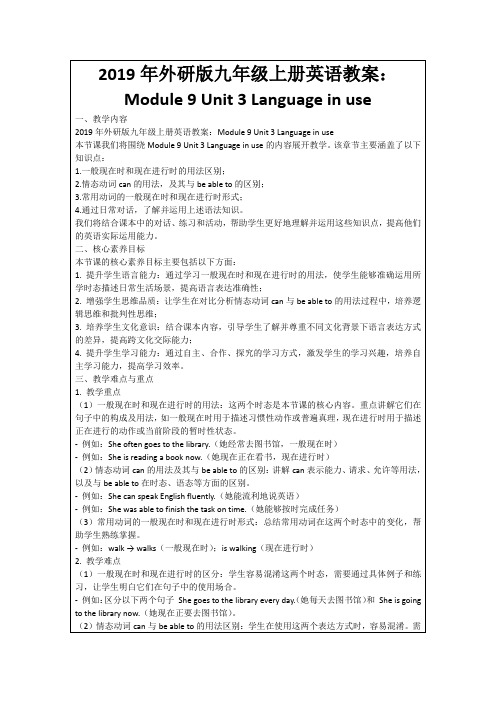
(三)实践活动(用时10分钟)
1.分组讨论:学生们将行时相关的实际问题。
2.实验操作:为了加深理解,我们将进行一个简单的角色扮演活动。这个活动将演示如何在实际对话中使用这两个时态。
2019年外研版九年级上册英语教案:Module 9 Unit 3 Language in use
一、教学内容
2019年外研版九年级上册英语教案:Module 9 Unit 3 Language in use
本节课我们将围绕Module 9 Unit 3 Language in use的内容展开教学。该章节主要涵盖了以下知识点:
-例如:go → goes(一般现在时);is going(现在进行时)
四、教学流程
(一)导入新课(用时5分钟)
同学们,今天我们将要学习的是Module 9 Unit 3 Language in use这一章节。在开始之前,我想先问大家一个问题:“你们在日常生活中是否遇到过描述正在进行的动作或描述某人经常做的事情的情况?”这个问题与我们将要学习的内容密切相关。通过这个问题,我希望能够引起大家的兴趣和好奇心,让我们一同探索一般现在时和现在进行时的奥秘。
(2)情态动词can与be able to的用法区别:学生在使用这两个表达方式时,容易混淆。需要通过实例讲解它们在不同语境下的使用。
-例如:区分以下两个句子She can sing very well.(她唱歌很好)和She is able to sing very well.(她能够唱得很好)。
(3)动词在一般现在时和现在进行时的变化:部分动词在变化过程中会出现不规则变化,学生需要重点掌握。
